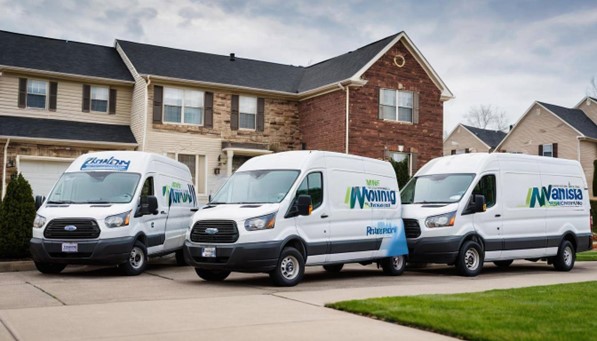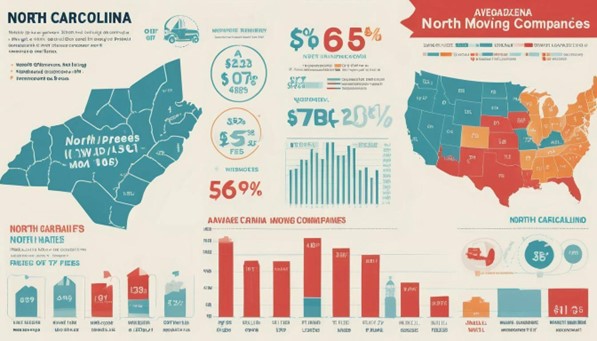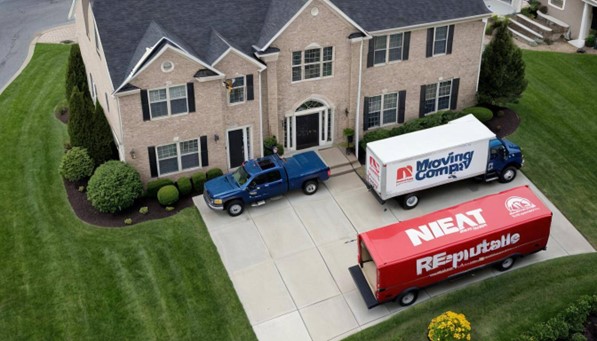Moving in North Carolina or any place involves costs that vary based on several factors. Generally, for a local move, you could be looking at around $80 to $100 per hour for two movers with a truck. Surprisingly, moving a 3-bedroom house can cost between $500 to $800, influenced heavily by distance and the need for extra services. Deciding on a mover isn’t just about cost though, keep reading.
The average rate for hiring movers in North Carolina can vary depending on the specific services required, distance of the move, and the amount of items being transported. However, as of 2024, the average hourly rate for local movers in North Carolina ranges from $80 to $100 per hour. For long-distance moves, the average cost may range from $2,000 to $5,000 based on the distance and volume of items. Keep in mind that these rates are subject to change and it’s recommended to obtain personalized quotes from moving companies.
Average Cost of Moving Within State
When it comes to moving within North Carolina, various factors influence the cost of your move. For a local move, the average rate is approximately $80 to $100 per hour for two movers and a truck. However, this rate can vary based on elements like the time of year, the specific location, and any additional services required.
It’s worth noting that the size of your home also plays a significant role in determining the total cost of your local move within North Carolina. For instance, if you’re moving from a 3-bedroom house, you can anticipate a cost range between $500 to $800, depending on the distance and any supplementary services needed. These additional services may include packing and unpacking, assembly and disassembly of furniture, and other specialized requirements.
Take, for example, a move from Raleigh to Charlotte, which spans approximately 170 miles. Factors such as mileage, fuel costs, and travel time will influence the overall quote provided by local moving companies. Additionally, adding packing services or requirements related to stairs or elevators during the move could further adjust the pricing.
Understanding the seasonal fluctuations in demand for moving services is essential. The summer months are often peak periods for relocations since families take advantage of children being out of school. Therefore, it’s common for moving costs to be slightly higher during this time due to increased demand.
In addition to direct costs, it’s vital for individuals planning a move within North Carolina to factor in potential indirect expenses such as packing supplies, insurance coverage, and any unforeseen charges that may arise during the process. While these costs aren’t always included in the initial estimate provided by movers, they play a crucial role in budgeting for your relocation.
Considering these multiple variables that contribute to the cost of moving within North Carolina, obtaining accurate quotes from local moving companies tailored to your specific circumstances will help you plan your budget effectively. By accounting for these diverse elements and potential fluctuations across different seasons, you can make informed decisions while ensuring a smooth transition to your new home.
Having gained insight into the diverse factors influencing the cost of moving within North Carolina, let’s now unveil the intricate web that shapes these expenses – exploring the various factors affecting moving costs.
Factors Affecting Moving Costs
When it comes to the cost of moving within North Carolina, several key factors come into play, each significant in its own right.
Distance
The distance between your current and new home has a substantial impact on the overall cost of your move within the state. Long distances typically entail more fuel, time, and labor, leading to higher expenses. A move from one end of North Carolina to another would understandably incur higher costs compared to a shorter local move.
This is because longer distances require more gas for the moving truck and more hours for the movers. Additionally, if a move involves crossing state lines or navigating through tricky terrains, additional logistical challenges may come into play, further affecting the cost.
Size of the Move
The size of your home and the volume of belongings being moved directly influence the cost. If you have a larger home or a considerable amount of furniture and personal items, it will naturally take more time and resources to relocate everything to your new location. Furthermore, heavier or bulkier items may also require extra manpower and specialized equipment for safe handling.
It’s essential to consider decluttering and downsizing before a move, as this can significantly reduce both the effort required and expenses incurred during the process.
Time of Year
The timing of your move within North Carolina can also impact the cost. Peak moving seasons, typically during the summer months, often result in higher rates due to increased demand for moving services. During these periods, the availability of reputable movers may be limited, leading to higher prices due to heightened competition.
For instance, families often plan their relocations during the summer months to avoid disrupting their children’s school year. This seasonal demand surge can lead to increased service charges by moving companies.
Additional Services
The need for supplementary services such as packing, assembly, disassembly, and storage can notably add to the total moving cost. While these services offer convenience and efficiency, they also come with an additional price tag.
Moreover, some delicate or large items may require specialized care during transportation, necessitating custom packaging or handling methods that contribute to extra costs. Furthermore, if temporary storage is required due to delays in occupancy or transitional periods between homes, this too will factor into the overall expense.
By considering these factors carefully and planning accordingly, you can make informed decisions about your upcoming move within North Carolina.
Included Services in Moving Rates
Standard moving rates generally include specific services that are essential for a smooth and efficient move. These are often bundled together to provide a comprehensive package that meets the basic requirements of most customers.
Loading and Unloading
Loading and unloading services are typically included in the standard rates of professional movers. The moving crew is responsible for carefully loading your belongings onto the moving truck, ensuring they are secured correctly for transportation, and unloading them at your new residence. This part of the service requires precision and expertise to handle items of various sizes and shapes, making sure fragile items are handled with extra care.
Transportation
Transportation is another crucial component included in moving rates. The cost of transportation covers the use of a moving truck, fuel, and any tolls that may be incurred during transit. The type and size of the truck will vary depending on the volume of belongings being transported, as well as the distance to be covered.
Disassembly and Reassembly of Furniture
Many reputable moving companies also include furniture disassembly and reassembly as part of their standard rates. This involves taking apart larger pieces of furniture, such as beds, tables, or cabinets to facilitate easier packing and loading for transport. Upon arrival at your new home, the movers will reassemble the furniture, ensuring it is placed where you desire.
Basic Valuation Coverage
Basic valuation coverage is commonly included in standard moving rates. This safeguards a certain level of protection for your belongings during the move. It’s important to understand the limitations and scope of this coverage, as certain high-value items may require additional insurance or special handling.
Packing and Unpacking Services
Some movers offer packing and unpacking services as an optional add-on to their standard rates. While this service can significantly reduce the stress associated with moving, it usually comes with an additional fee. Many individuals find value in having professionals handle the packing process. It ensures that items are securely packed using appropriate materials and techniques while saving them considerable time and effort.
Incorporating these services into standard moving rates provides a level of convenience and peace of mind for individuals navigating a move. It’s important to carefully review and understand what is included in your chosen moving company’s standard rates to ensure that vital services are not overlooked or assumed.
As we’ve now explored the key components encompassed within standard moving rates, let’s shift our focus to the critical aspect of obtaining an accurate estimate for your impending move.
Getting an Accurate Moving Estimate
When it comes to moving, accurately estimating the cost can make all the difference. Here’s how you can ensure that you’re getting an estimate that is as close to reality as possible.
In-Home Assessment
One critical step in obtaining an accurate moving estimate is allowing the moving company representatives to conduct an in-home assessment. This assessment involves a thorough survey of your belongings and living space. By physically seeing the items to be moved, movers can better understand the volume, type, and weight of your possessions. This paves the way for a more precise calculation of the actual moving costs.
This in-person evaluation is particularly essential for larger moves or relocations involving specialty items such as pianos or delicate antiques. It allows the movers to assess any potential challenges, such as navigating tight stairways or narrow hallways, which may impact the cost and logistics of the move. Ultimately, this fine-grained inspection sets the stage for a transparent and comprehensive cost estimate.
Transparent Communication
Another key factor in obtaining an accurate moving estimate is maintaining open and transparent communication with the moving company. It’s important to provide them with all crucial details about your move to ensure that the estimate covers all necessary services and potential challenges.
When communicating with the movers, be sure to inform them about any unique or specialized items that require special handling, such as fragile artwork or bulky furniture pieces. Additionally, if there are any access limitations at either your current or new residence—like on-street parking constraints or restricted entryways—these details should be shared during the initial discussions.
The more information you provide regarding your specific moving needs and circumstances, the more accurate and inclusive your estimate will be. Clear and open communication enables the movers to devise a tailored plan that addresses your unique requirements while mitigating potential surprises on moving day.
By following these steps—allowing for an in-home assessment and maintaining transparent communication throughout the estimation process—you can significantly increase the likelihood of receiving a precise cost estimate that aligns with your actual moving needs. This proactive approach not only fosters trust and confidence but also lays a solid foundation for a smooth and efficient relocation experience.
Stepping into the world of comparing local moving companies reveals a landscape filled with diverse offerings and distinct service levels. Let’s now delve deeper into this intricate tapestry to uncover what sets one mover apart from another.
Comparing Local Moving Companies

So, you’ve got a few local moving companies in mind and you’re ready to compare them to find the right one for your move. Here are the critical factors that can help you make a well-informed decision:
Reputation and Reviews
When it comes to reputation and reviews of local movers, it’s crucial to dive deep into what others are saying. Look for customer reviews and ratings on platforms like Google, Yelp, or the Better Business Bureau to gauge the company’s reputation. Pay attention to both positive and negative experiences shared by customers. A pattern of consistently positive reviews may indicate reliability and quality service, while multiple negative reviews may be a red flag. Additionally, check if the company has won any industry awards or if they are affiliated with professional organizations. A good reputation often speaks volumes about a moving company’s commitment to customer satisfaction and service quality.
When reading reviews, keep in mind that businesses can sometimes receive fake reviews, both positive and negative. It’s important to look at trends rather than isolated comments.
Licensing and Insurance
Checking for proper licensing and insurance is non-negotiable when evaluating a potential moving company. Ensure the moving company is licensed and adequately insured to protect your belongings during the move. Licensing ensures that the company complies with legal regulations, professional standards, and safety measures set by local authorities. Adequate insurance coverage provides peace of mind knowing that your possessions are protected against damage or loss during transit. Ask the moving company for their license information and proof of insurance before making any commitments.
Avoid working with movers who cannot provide evidence of valid licensing and insurance.
Transparent Pricing
Transparent pricing is essential when engaging with a local moving company. Look for a company that offers a detailed breakdown of all costs involved in your move, including any additional fees or surcharges. Clear communication about pricing helps avoid unexpected expenses and ensures that you fully understand what services are included in the estimate. Be wary of companies that provide vague or ambiguous quotes, as this can lead to disputes or inflated charges later on.
Think of transparent pricing as a clear roadmap—without it, you might end up lost or facing unwanted surprises along the way.
By considering these key factors, you can gain valuable insights into the reliability, professionalism, and trustworthiness of local moving companies. Making an informed decision based on these considerations can contribute to a smoother and more stress-free moving experience for you and your possessions.
As you weigh these critical considerations to select the perfect local mover, let’s now shift our focus to exploring the vital aspect of insurance coverage provided by movers.
Insurance Coverage by Movers
When it comes to entrusting your possessions to a moving company, ensuring they are adequately insured is paramount. Most moving companies typically offer what is known as basic valuation coverage. This level of protection provides minimal compensation based on the weight of the items being moved rather than their actual value.
In practical terms, this means that if something is damaged or lost during the move, the compensation you receive will be calculated based on its weight and not its worth. Understandably, this type of coverage can be quite limited and may not fully protect items with substantial material or sentimental value.
Given these limitations, it’s highly advisable to inquire about additional insurance options with the moving company. Many reputable movers provide supplementary insurance plans that offer more comprehensive coverage for your belongings. These plans typically come with different pricing tiers and varying levels of protection. For example, Full Value Protection is a comprehensive option which covers the repair, replacement, or reimbursement for damaged items, taking into account their current market value.
Let’s say you have a collection of rare and delicate porcelain dishes, inherited from your great-grandmother. In a basic valuation coverage scenario, if one of these dishes were to be damaged in transit, you may only receive a minimal amount relative to its weight. However, by opting for additional insurance options such as Full Value Protection, you can be assured that these cherished heirlooms are adequately covered in case of accidental damage.
For those planning a move that involves transporting high-value items, such as artwork, antiques, or expensive electronics, investing in comprehensive insurance coverage can bring peace of mind. While it may entail an additional cost, the security it offers in safeguarding your prized possessions throughout the journey is invaluable.
Understanding the crucial role that comprehensive insurance plays in protecting your belongings during a move reinforces the need to thoroughly explore insurance options provided by potential moving companies to ensure your valuables are adequately covered.
Hidden Fees and Policy Comparisons

When it comes to your moving expenses, there’s more to the bottom line than just the initial quote you receive. Many moving companies may have extra charges hidden within their contracts that aren’t immediately obvious. These can include long-carry charges, flight charges, or fees for handling specialty items. It’s like finding a surprise at the bottom of a treasure chest, only this one can lead to some budgetary stress on the big moving day.
Long-carry charges, for instance, are applied when the entrance of your home is far from where the moving truck can park, resulting in the movers having to carry your belongings a great distance. Similarly, flight charges come into play if your movers have to navigate stairs or elevators instead of using a direct path from your home to their truck. These additional costs can sneak up and surprise you if not thoroughly discussed and reviewed before signing any service agreements.
Carefully reviewing these aspects when comparing different moving companies’ policies can help you avoid any unexpected financial shocks on moving day.
Policy Comparisons
When you’re in discussions with moving companies, comparing their policies side by side can provide valuable insights into the true costs associated with your move. Some companies may bundle additional services at no extra charge, while others might charge separately for each add-on.
For example, company A might include basic packing materials in their standard package, whereas company B might charge separately for these items. Company C might offer full-value protection as part of their comprehensive package, while company D might only provide it for an added fee. Getting clear and transparent details on such aspects will allow you to make an informed decision that aligns with your specific needs and budget.
Imagine setting a beautiful vase aside from other boxes to ensure its safety during the move, only to find out later that there’s an extra charge for handling fragile items. Knowing these subtle differences in policies will prevent any surprises as you prepare to transition to your new home.
By meticulously examining these often overlooked aspects of moving contracts, you can make sure that you are fully aware of all potential charges and fees associated with your move. This level of attention to detail sets you up to choose a reputable mover who provides transparency throughout the move and ensures there are no unwelcome financial surprises along the way.
Taking the time to understand and compare the fine print of moving companies’ policies is essential in ensuring a smooth and financially stress-free move. Your diligence now saves you from unwelcome surprises later.
